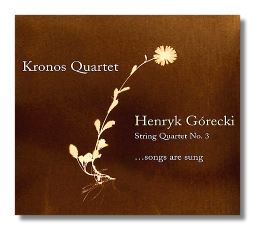
The Internet's Premier Classical Music Source
Related Links
- Górecki Reviews
- Latest Reviews
- More Reviews
-
By Composer
-
Collections
DVD & Blu-ray
Books
Concert Reviews
Articles/Interviews
Software
Audio
Search Amazon
Recommended Links
Site News
 CD Review
CD Review
Henryk-Mikołaj Górecki

String Quartet #3 "… songs are sung"
Kronos Quartet
Nonesuch 104380-2 DDD 50:15
For all intents and purposes, Górecki completed his Third String Quartet in 1995, but the composer kept the work out of circulation until 2005, when it was premièred in Poland by the Kronos Quartet on October 15. Górecki claims not to know why he held the quartet back, and Adrian Thomas, the composer's biographer, and author of Nonesuch's booklet note, does not attempt an explanation. Perhaps there was a part of Górecki, like any parent, who wished that his "child" would never leave home.
The quartet's subtitle is an allusion to a poem by the Russian author Velimir Khlebnikov, who wrote, "When people die, they sing songs." In many ways, the quartet seems to be a reflection on mortality, and while it is often morbid (in fact, there is a passage in the fourth movement marked "morbido"), it isn't despairing in the way that Tchaikovsky's Sixth Symphony (for example) is. That is the quartet's most obvious connection to the composer's famous Third Symphony, the "Symphony of Sorrowful Songs"… that, and the use of repetition, and the sensation of pulling oneself forward – slowly, painfully, yet restlessly – through deceptively simple musical materials. The repetition is not in the manner of Glass or Reich, who often keep the music's surface flickering with life. Górecki's repetitions are much slower, dogged, one note at a time developments. The music is heavy, weighed down. New notes generally are not introduced before the old ones have been thoroughly chewed over. As in the symphony, the dominant tempos are slow and slower, although there are more animated passages in the middle of the work. The harmonic language is not at all difficult, though. The biggest challenged faced by listeners (and by performers, I would imagine) is maintaining concentration over the entire work's time-frame.
If "… songs are sung" is about anything in particular, memory seems to be the most likely subject. The memories of the old and the sick, while particularly fallible, can be most unexpectedly beautiful. In this quartet, the performers often seem to be reassuring themselves about a sequence of notes, the way that we nervously repeat phone numbers to ourselves when we are without paper to write them upon. Thomas' notes cite "the elusiveness of memory" and "the mind's ability to repeat ideas but to lose itself in them through that very repetition." This seems to be the music's key. Some listeners have disliked this quartet, calling it tedious and drab. To my mind, it is an unsentimentally honest composition, full of human sympathy, but implacable in its examination of how even our hold on the past sooner or later slips through our fingers. It is ridiculous to expect this composer to write the Third Symphony over and over again, just because audiences liked it.
The Kronos Quartet recorded the First and Second String Quartets more than a decade ago (Nonesuch 79319-2), and I have no doubt that their recording of this new (but not so new!) quartet will remain unsurpassed. When tonal allure is required, the Kronos can deliver, and they always get to the intellectual heart of the music that they perform. Even though they sometimes go off on loopy tangents (their Bollywood CD with Asha Bhosle, for example), they are serious musicians who have a genuine commitment to contemporary classical music… no lip service here.
Copyright © 2007, Raymond Tuttle




















